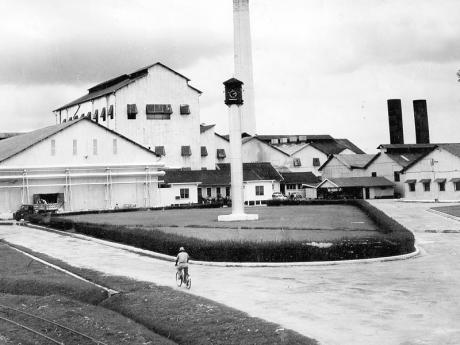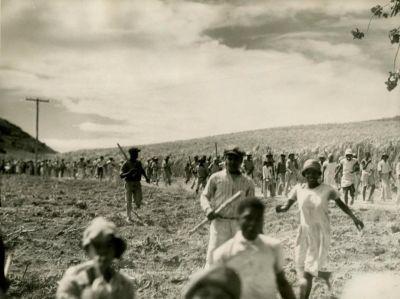British colonial police massacred construction workers at the Frome sugar factory in Jamaica.
On 3 May 1938, British colonial police massacred construction workers striking for a pay increase at the Frome sugar factory in Jamaica. Three were killed by gunshot, one by bayonet and at least 25 were injured. They also arrested 109 workers and charged them with “riotous assembly”, sentencing many to up to one year’s imprisonment. But the repression sparked widespread demonstrations and strikes by other workers across the island. https://libcom.org/…/labour-rebellions-1930s-british…

Published in 2002 jointly by Caribbean Labour Solidarity and the Socialist History Society
About the author: Jamaican trade unionist Richard Hart.
Richard Hart was involved in trade union activities in the British Caribbean region colonies for many years. A member of the Labour Committee formed in Jamaica in 1938 by Norman Manley to assist William Alexander Bustamante in the formation of a trade union, he had the responsibility of drafting a model trade union constitution. He was in 1939 the Secretary of the Trade Union Advisory Council, which subsequently became the Trade Union Council. President of the Jamaica Government Railway Employees Union from 1942 until its merger with other unions in 1948, he was a Vice President of the Trade Union Congress of Jamaica from 1949 to 1953. On the wider regional plain he was Assistant Secretary of the Caribbean Labour Congress on its formation in 1945 and its Secretary from 1946 until its demise in 1953. Hart died 21 December 2013 (aged 96) in Bristol, England, United Kingdom.

The Labour Rebellion in Jamaica
In the first quarter of 1937 the growing unrest among peasants, many of whom both farmed their own or rented plots of land and also worked part time on larger properties, and landless agricultural workers, found organisational expression in upper Clarendon in central Jamaica. Robert E Rumble, a small farmer who had returned from Cuba where he had acquired the trade of a coach builder and wheelwright, had formed an organisation which he called the Poor Man’s Improvement and Land Settlement Association. By March 1938 he claimed a membership of 800 for his organisation. On 23 April 1938 this organisation addressed a Petition to the Governor:
“We are the Sons of Slaves who have been paying rent to the Landlords for fully many decades we want better wages, we have been exploited for years and we are looking to you to help us. We want a Minimum Wage Law. We want freedom in this the hundredth year of our Emancipation. We are still economic slaves, burdened in paying rent to Landlords who are sucking out our vitalities.”[28]
Agitation was conducted by Rumble and his organisation for land for the peasants and proto-peasants and for better wages for agricultural workers. A movement to refuse to pay any more rent to landlords began to spread and, in some areas, land hungry people seized estate lands. This was fuelled by the revival of a widely held belief that Queen Victoria had promised that, 100 years after their emancipation, the slaves who had got nothing at the time of the abolition of slavery would inherit the land. Tenants and others who seized lands began to erect fences and offered to pay taxes on the lands the ownership of which they claimed to have acquired.[29]
At the end of December 1937 workers on Serge Island Estate in St Thomas, at the eastern end of the island, refused to start reaping the crop at the rates of pay offered. Police were rushed to the area and, on 4 January, 1938, they reported that some 400 to 500 strikers had forced others to cease work. Sixty-three of the strikers were arrested and, over a period of three days from 13 January, were tried before the Resident Magistrate. Three “ring-leaders” were sentenced to one month’s imprisonment with hard labour, 7 were fined £2 and 11 were fined 21/- each with the alternative in default of payment of 30 and 21 days imprisonment respectively. 45 others were admonished and discharged.[30] These were relatively lenient sentences.
On 29 March, warned that dissatisfaction among the lowest paid manual workers was assuming island-wide proportions, the Government announced the appointment of a Commission to enquire into rates of wages and conditions of employment of labourers in receipt of not more than thirty shillings per week, its first session to be held on 11 April.[31]
During the first quarter of 1938, large numbers of workers had been converging on Westmoreland at the western end of the island, attracted by the possibility of employment. On 2 May the Daily Gleaner published this report:
“One thousand labourers, a large proportion of them engaged on the erection of a giant Central Sugar Factory at Frome Estate …went on strike Friday. They are still out and state that they will only return to work when their demand – one dollar [4/-] per day – is met by the West Indies Sugar Company.”[32]
Next day the newspaper’s reporter on the spot reported:
“The old factory on the estate, which up to Friday had been grinding canes, is entirely in the hands of the strikers … I hear rifle firing, followed by shrieks and cries … I can see men on the ground. Some are motionless, others are staggering to and fro or crawling away on their hands and knees. The strike has culminated in stark tragedy. A few minutes later I hear that three are dead, eleven wounded and that the police are making many arrests.”[33]
Four people were killed that day, three by police gunshot and one by a police bayonet. On 4 May the Gleaner reported that “the known cases of persons suffering from wounds has not exceeded twenty-five, the arrests up to yesterday afternoon reached 96”.[34] But the wounded may have been more numerous as there was a widespread belief that anyone who sought medical treatment would be thereby identifying himself as a participant and inviting arrest. On 13 May the first batch of 27 of the 109 strikers arrested was rushed to trial before the Resident Magistrate at Savanna la Mar, charged with “riotous assembly”. The sentences ranged from 30 days to 1 year’s imprisonment. At the same time the Governor appointed a Commission to enquire into the disorders.
The events at Frome had an electrifying effect. There were demonstrations of unemployed workers in Kingston, the capital. Waterfront workers in Kingston put forward demands for wage increases and, at the end of the second week of May, came out on strike. On 23 May many other workers in the city struck work and work in the city came to a halt, all the major stores were forced to put up their shutters by marching workers.
On 24 May, the Governor ordered the arrest of William Alexander Bustamante, a popular figure who during recent months had been addressing public protest meetings and writing letters to British Members of Parliament revealing the distressing economic conditions prevailing in the island.[35] The arrest of Bustamante and his principal assistant St William Grant,[36] and the initial refusal to grant them bail, was a provocation which, despite the appointment of an officially sponsored Conciliation Board on 26 May, unleashed a wave of further strikes and riots.
A week later, realising that the only way to ease the situation was to release Bustamante and Grant, the Government agreed to bail being granted. By that time however the spirit of revolt had spread throughout the island and strikes and demonstrations were occurring in every parish. This situation continued for many weeks, despite the use of the battalion of British troops stationed on the island to supplement the police. Workers were killed and injured and many arrests took place.[37]
By the end of June calm had been restored. A number of factors had contributed to this. Perhaps the most important had been the launching by Bustamante of a trade union and assurances from him and the much respected barrister N W Manley[38] that the workers would receive proper representation. The announcement on 14 June that a Royal Commission would be arriving shortly to investigate conditions had undoubtedly created expectations that improvements would be forthcoming. On 28 June Acting Governor Woolley had announced in the Legislative Council that two loans would be raised to finance land settlements and other infrastructural developments.[39]https://libcom.org/…/labour-rebellions-1930s-british…
